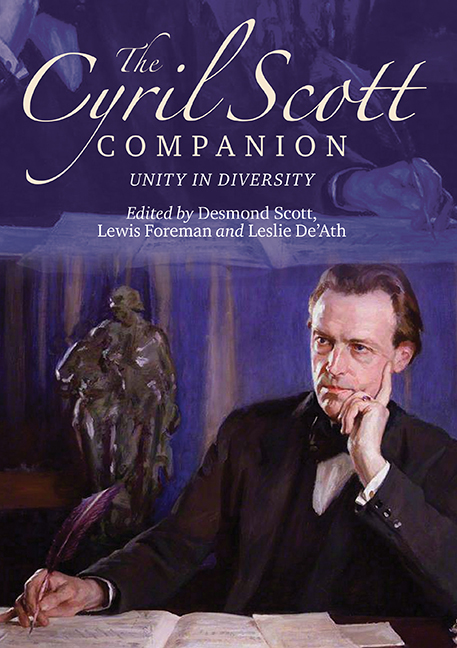Book contents
- Frontmatter
- Dedication
- Contents
- List of Illustrations
- List of Tables
- List of Contributors
- Foreword
- Preface
- Acknowledgements
- Editors' Note
- I SCOTT IN CONTEXT
- II THE MUSIC
- III THE WRITINGS
- 17 The Poetry
- 18 The Occult Writings
- 19 The Purpose of The Boy Who Saw True
- 20 Near the End of Life: Candid Confessions and Reflections: A Discussion of the Memoir
- 21 The Therapeutic Books
- 22 Childishness or The Moron Mind
- 23 A Note on the Plays
- IV PERSONAL REMINISCENCES
- APPENDICES
- CATALOGUES, DISCOGRAPHY AND BIBLIOGRAPHY
- Index of Works
- General Index
17 - The Poetry
from III - THE WRITINGS
Published online by Cambridge University Press: 14 September 2019
- Frontmatter
- Dedication
- Contents
- List of Illustrations
- List of Tables
- List of Contributors
- Foreword
- Preface
- Acknowledgements
- Editors' Note
- I SCOTT IN CONTEXT
- II THE MUSIC
- III THE WRITINGS
- 17 The Poetry
- 18 The Occult Writings
- 19 The Purpose of The Boy Who Saw True
- 20 Near the End of Life: Candid Confessions and Reflections: A Discussion of the Memoir
- 21 The Therapeutic Books
- 22 Childishness or The Moron Mind
- 23 A Note on the Plays
- IV PERSONAL REMINISCENCES
- APPENDICES
- CATALOGUES, DISCOGRAPHY AND BIBLIOGRAPHY
- Index of Works
- General Index
Summary
AT first glance, the poetry of Cyril Scott would seem to be the antithesis of his music, which was considered advanced in his day. In music he was thought of as an iconoclast, breaking all the rules and flouting convention. His poetry, by contrast, harks back to the Victorian era in which he grew up, abides by all the rules, and would not be out of place beside the poems of Swinburne, the Rossettis (Dante Gabriel and Christina), or his favourite, Ernest Dowson, twenty-two of whose verses he set to music.
Even so, Scott stated that ‘were he not a musician he could not be a poet, and were he not a poet he would compose a very different sort of music.’ It was the German poet Stefan George, whom Scott had met while a music student in Frankfurt, who introduced him to the poetry of Dowson, and, but for that, Scott wrote, he might never have become a poet. Until that time poetry had not interested him in the least, but thereafter it became almost a passion.
For ten years, between 1905 and 1915, he was a prolific poet. He published The Shadows of Silence and the Songs of Yesterday (c. 1905), The Grave of Eros and the Book of Mournful Melodies, with Dreams from the East (1907), The Voice of the Ancient (1910), The Vales of Unity (1912), and The Celestial Aftermath (1915). In addition, he translated Charles Baudelaire's Les fleurs du mal in 1909, and in 1910 a selection of poems by his friend Stefan George, ‘The Awakener within me of all Poetry’, as Scott's dedication to him in The Grave of Eros reads.
In 1915 he ceased writing poetry altogether for almost thirty years, but in 1943 he selected what he felt were his best poems, taken mainly from The Shadows of Silence and The Grave of Eros, added sixteen new ones and completed a final collection, The Poems of a Musician (unpublished). A short note at the beginning reads:
This volume contains, apart from my latest poems, a selection of those experiments in rhythm that I made in my early years. But as even those I consider worth retaining were marred by many imperfections, they are here given out in an amended form. Sept. 1943.
- Type
- Chapter
- Information
- The Cyril Scott CompanionUnity in Diversity, pp. 311 - 322Publisher: Boydell & BrewerPrint publication year: 2018



